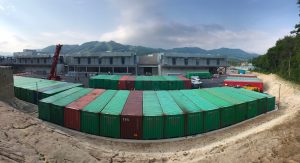Thought Leadership: Tackling the complexities of logistics with SOS Global

A nice picture: The containers neatly arranged at the IBC in South Korea for Winter Olympics 2018
One area that is often overlooked in sports broadcasting is the logistics of transporting all the kit required for a production to the location of the event, be that at a local football stadium or the other side of the world.
Freight forwarder serving the broadcasting industry SOS Global is one of those companies making that process simpler.
Here we chat to Michael Tenenbaum, managing director at SOS Global, to find out more.
What are the main transportation challenges for international sport broadcasting events?
The primary challenges of handling logistics for major events are threefold. The first is the constantly changing needs and environment. Flexibility is key; our job is to provide our clients with increased visibility and overall transparency from start to finish of their event.
We work with a wide variety of clients that literally cover the globe, therefore we need to understand and implement a diverse set of competencies in highly variable environments to be successful. As an example, understanding infrastructure challenges to possible safety concerns for onsite personal and equipment. It’s critically important that we fully investigate each potential variable and mitigate any likely supply chain risk.
Also, balancing costs considerations with reliability and safety of transport. The larger scale and global events intrinsically have longer supply chain needs and therefore have a greater potential for disruption from weather-related delays to social-political events.
Our job is to identify and assess these potential risks and provide flexible solutions to our customers before they become problems, so that timelines and budgets are met without sacrificing safety standards.
What are the biggest trends you are seeing today in your field, that are also having an effect on what you do or how you do business?
Driver shortage and retention. As recently industry published numbers would suggest, there is a driver shortfall of nearly 150,000 in the United States and the shortage across Europe totals around 200,000 unfilled positions.
Also, the regulatory environment. Carriers face ongoing, complex and constantly changing federal regulations and international compliance standards.
Then there are environmental Issues; sharply reducing greenhouse gases and other noxious emissions from all major modes of transport [is necessary], including trucking, air cargo and ocean shipments.
How does sustainability come into play in transportation for international sporting events? What is difficult to achieve, and what changes (if any) have you made, or been able to help clients make to reduce their CO2 footprint?
The majority of our customers are now researching methods and options available to not only understand their current carbon footprint but also actively looking for opportunities to reduce their fossil fuel consumption and emissions.
For example, we are in the process of integrating electric and natural gas vehicles throughout our Tokyo 2020 operational offering. In addition, we track and report our carbon emissions for all operations, including trucking, air freight and sea freight.
How are you working on the Olympic Games Tokyo 2020? Who are you working with, what are the challenges and what is the timeline you are working to?
SOS Global is working with the host broadcaster as well a number of MRLs. Operations and planning started at the closing of Pyeongchang 2018 Games.
We anticipate deploying our onsite team from an operational standpoint in September of 2019…and expect to finish this project approximately two months after the Olympic Games have concluded.
